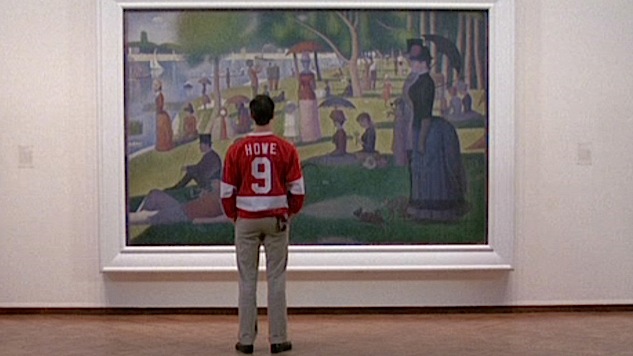Ferris Bueller’s Day Off Review
One of the most infamous traits of pop-culture movies, especially from the 80s and 90s, is deep messages masked beneath frivolity. Many movies that could at face value be dismissed as entertainment for the simple-minded masses can often contain thought-provoking themes and ideas if a person stops to read between the lines. Ferris Bueller is no exception to this trend. The film itself is a fun teenage adventurer story at first glance. However, upon closer observation, the movie portrays powerful messages about adolescence, self-worth, self-discovery, and the passage of time. There are so many ways to interpret a movie as layered as this, and I would like to explore just a few of them.
My first interpretation is that Cameron is the main character. Allow me to elaborate. Ferris is the one with all the screentime, all the action, and all the lines, but he is a static character. He begins the story exactly how he started it. Nothing has changed for him. Cameron is the one with a character arc. In order to argue this point, I would first like to highlight the depth of Cameron’s character by analyzing the museum scene. The movie makes it very obvious that Cameron’s home life is far from ideal. Most people point to the obvious fact that Cameron’s dad cares about a car more than him. The scene that I would point out, however, is the museum scene where Cameron stares into the painting of a parent with its child. He is captivated by the painting because it contains something that he has always wanted but never had: a loving childhood. That is why the camera keeps zooming closer and closer until the child is nothing but paint specs on the wall: upon closer inspection you realize the child isn’t really there. It’s nothing more than paint on a canvas. This scene is a metaphor for Cameron’s childhood: no matter how hard he tries to remember them, Cameron cannot find the memories of him and his parents. They were simply never there for him. That is why Cameron not only wants, but NEEDS to take a stand against his father, which he finally does by destroying the symbol of his neglect: his father’s Ferrari. By the end of the movie, Cameron has finally gained the courage to fight for his OWN necessities, rather than go along with whatever everyone around him says. Through the events of the story, he overcame the TRUE challenge of his life and learned a valuable lesson about self-worth. Cameron is the main character. He is an exploration of child neglect and self-discovery.
Now that I have properly analyzed Cameron’s character, I would like to give my second interpretation: Ferris Bueller isn’t real. More specifically, he is a projection of Cameron’s own life desires. Ferris is everything that Cameron is not. He has two unbelievably loving parents, everyone at school adores him, and he somehow manages to get away with absolutely everything. Ferris is too perfect to possibly exist. He is what Cameron IMAGINES it’s like to be the popular kid. It’s why Ferris somehow manages to coordinate a dance number in a matter of minutes, and how literally every event works in his favor. He is the teenage dream, everything Cameron seems to secretly want but can never have: attention, parental support, and a girlfriend. That is why when Cameron finally smashes the car, it’s the last scene we see of him with Ferris. He has finally rid himself of that fantasy and started dealing with the REAL problems of his life. It’s also important to note that Ferris is very selfish and uncaring of Cameron’s perfectly understandable fear of getting caught. In reality, being the “coolest guy” out often entails being very selfish towards others, hence why the fantasy is just that: a fantasy. Everyone thinks that they want to be Ferris, but that can only work in a fantasy world.
A few possible nuances I would like to add to this interpretation is that Ferris isn’t ENTIRELY fake. He is real, and he is the popular kid at school, but Cameron is not actually friends with him, and the entire adventure is Cameron imagining what it WOULD be like to be friends with the coolest guy in the world. As for Sloane, I think she is someone who Cameron is friends with and definitely smitten for, but not dating. Cameron can only dream about what it would be like to date her through his projection of Ferris Bueller.
My final interpretation takes this nuance a step further. I think it’s possible that Ferris really IS friends with Cameron, and that the purpose of the entire adventure was for Ferris to teach his spineless friend how to stand up for himself. Ferris intentionally acts manipulative of Cameron in order to help him realize how badly he needs to wake up and start fighting adversity instead of complying with it. This interpretation is strongly supported in the scene when Ferris expresses genuine concern that Cameron will one day fall in love with someone who walks all over him and spend the rest of his life being a pushover if he doesn’t take a stand now.
An additional observation of the movie I made is how many of the side characters just miss seeing Ferris by a few seconds because they are preoccupied with something else. Nobody ever catches Ferris because they are too busy with other tasks. Ferris symbolizes how people are often so preoccupied with getting somewhere and doing something that they never once stop to look around and appreciate life every now and then. The film is telling us that we have to once in a while take a moment to “smell the roses” and observe the beauty happening right in front of our faces. If we do not, life will pass us right by, and we’d have no idea what we were missing.
On the topic of appreciation, I’d like to take a moment to comment on my personal favorite scene: the museum scene. It perfectly contrasts the goofy tone present in the rest of the movie, and stands out as a beautiful interlude in a series of wacky antics. Its memorability as a scene is undoubtedly owed to the cinematography. The framing of Ferris, Sloane, and Cameron standing next to each other is one of my favorite shots of all time in a movie. Their experience at the museum is also a commentary on adolescence and growing up. When they first get there they hold hands with the young children on a field trip, but later on we see them stoically staring at the paintings on the wall like mature adults. They are neither kids, nor adults, and are currently exploring the realm between those two stages of life. Furthermore, the scene helps to convey the message of taking time to slow down and observe the smaller things in life. Ferris kissing Sloane in front of the blue glass and Cameron staring into the painting are examples of how the slow, simple moments in life can be just as enjoyable as any other.
Ferris Bueller’s Day Off is a movie that can be enjoyed by anyone willing to watch it. It’s an entertaining film in its own right, and the rich subtext behind its frivolous nature only adds to its merit. I’m very glad that I had the opportunity to share the many interpretations and observations I made while watching it, and I hope to share many more in the future.








